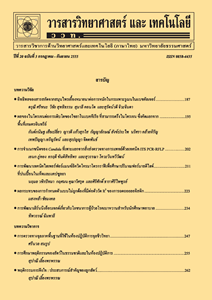ปัจจัยที่มีผลต่อระดับสุขภาพจิตของผู้สูงอายุ
Main Article Content
Abstract
บทคัดย่อ
การวิจัยครั้งนี้เป็นการศึกษาเชิงพรรณา (descriptive research) โดยมีวัตถุประสงค์ เพื่อศึกษาระดับสุขภาพจิตของผู้สูงอายุและความสัมพันธ์ของปัจจัยที่มีผลต่อระดับสุขภาพจิตของผู้สูงอายุ กลุ่มตัวอย่างคือผู้สูงอายุ อายุตั้งแต่ 60 ปี ขึ้นไป ในเขตจังหวัดปทุมธานี จำนวน 400 คน โดยได้ขนาดของกลุ่มตัวอย่างจากการคำนวณด้วยสูตรของ Taro Yamane เครื่องมือที่ใช้เป็นแบบสอบถามจำนวน 3 ส่วน ได้แก่ (1) แบบสอบถามลักษณะทางประชากร (2) แบบสอบถามวิธีการจัดการปัญหา (ways of coping questionnaire, WOC) สร้างและพัฒนาโดย Folkman และ Lazarus (1988) (3) แบบทดสอบดัชนีชี้วัดสุขภาพจิตคนไทยฉบับสั้น 15 ข้อ ปี พ.ศ. 2550 ของกรมสุขภาพจิต การวิเคราะห์ข้อมูลโดยใช้วิธีการทางสถิติ ได้แก่ (1) ข้อมูลส่วนบุคคล เพศ อายุ สถานภาพสมรส และรายได้วิเคราะห์โดยใช้สถิติแจกแจงความถี่และร้อยละ (2) ระดับคะแนนวิธีการจัดการปัญหาวิเคราะห์ข้อมูลโดยใช้สถิติแจกแจงความถี่และร้อยละ (3) ระดับคะแนนสุขภาพจิตวิเคราะห์ข้อมูลโดยคำนวณหาค่าเฉลี่ยและส่วนเบี่ยงเบนมาตรฐาน และ (4) วิเคราะห์ปัจจัยด้านสถานภาพสมรสวิเคราะห์ปัจจัยด้านรายได้วิเคราะห์ต่อระดับสุขภาพจิตด้วยสถิติ ANOVA ตามลำดับ ผลการวิจัยพบว่าระดับคะแนนค่าสุขภาพจิตของกลุ่มตัวอย่างมีค่าเฉลี่ยระดับสุขภาพจิตเท่ากับ 43.48 คะแนน S.D. เท่ากับ 3.968 แปลผลอยู่ในเกณฑ์สุขภาพจิตเท่ากับคนทั่วไป (fair) จำแนกออกเป็น ด้านปัจจัย 2 ปัจจัย พบว่า (1) กลุ่มตัวอย่างที่มีรายได้ของตนเองมีระดับคะแนนสุขภาพจิตเท่ากับ 43.63 ซึ่งเป็นคะแนนระดับสุขภาพจิตที่สูงกว่า กลุ่มตัวอย่างที่ไม่มีรายได้เป็นของตนเองมีระดับคะแนนสุขภาพจิตเท่ากับ 43.19 และ (2) สถานภาพสมรสโสดมีระดับคะแนนสุขภาพจิตเท่ากับ 43.92 ซึ่งเป็นระดับคะแนนสุขภาพจิตที่สูงที่สุด รองลงมาคือสถานภาพคู่ หย่าร้าง และหม้าย โดยมีระดับคะแนนสุขภาพจิตเท่ากับ 43.77, 43.40, และ 43.21 ตามลำดับ ทุกสถานภาพสมรสสามารถแปลผลอยู่ในเกณฑ์สุขภาพจิตเท่ากับคนทั่วไป (fair) นำมาหาความสัมพันธ์พบว่าปัจจัยด้านสถานภาพสมรสส่งผลให้ระดับสุขภาพจิตแตกต่างกันอย่างมีนัยสำคัญทางสถิติที่ระดับ 0.05 และปัจจัยด้านรายได้ส่งผลให้ระดับสุขภาพจิตแตกต่างกันอย่างมีนัยสำคัญทางสถิติที่ระดับ 0.05 ข้อเสนอแนะในการนำผลวิจัยไปใช้คือควรจัดให้มีการจัดโครงการส่งเสริมเกี่ยวกับการดูแลสุขภาพจิตผู้สูงอายุในชุมชน ทั้งในเรื่องการวางแผนการใช้ชีวิตต่อไป การจัดหาแหล่งหารายได้เสริมของผู้สูงอายุที่ไม่มีรายได้เป็นของตนเองเท่าที่ความสามารถของผู้สูงอายุนั้นมี เพื่อส่งเสริมให้ผู้สูงอายุคงไว้/ส่งเสริมการปฏิบัติตัวเพื่อการมีสุขภาพจิตที่ดี
คำสำคัญ : ระดับสุขภาพจิต; ผู้สูงอายุ; การจัดการปัญหา
Abstract
This research study was of a descriptive design. The objective of the research was to study the level mental health of elderly and relationship of the determinants of mental health among aging. The sample consisted of sixty male and female people are in Pathum Thani; their ages ranged from 60 years up amount 400 people. The sample size was calculated from the formula Taro Yamane. The tool was a questionnaire including three parts: Part 1 demographic questionnaire, part 2 the way to handle the problem (ways of coping questionnaire, WOC) created and developed by Folkman and Lazarus (1988), and part 3 test the mental health indicators for Thailand shorter version of article 15 of the 2550 department of mental health. The data was analyzed using statistical methods: (1) personal information, gender, age, marital status, income, analyzed by using frequency and percentage, (2) scale of the problem management and scale of mental health analyzed by mean and percentage, and (3) analyze the factors of marital status and income in relation to mental health were analyzed using ANOVA. The results showed that the mental health scores of the sample with an average of 43.48 points S.D. 3.968 results in terms of general mental health (fair). The factors were divided into two factors were found; (1) samples with an average income of their own psychological level of 43.63 which is higher than the average level of mental health samples with no income of their own, an average of 43.19 psychological level, and (2) marital status: Single has average of 43.92 psychological level, the highest average, followed by the couple divorced and widowed status, with an average level of mental health as 43.77, 43.40, and 43.21 respectively. All married were interpreted in terms of the general mental health (fair). Then the relationship of these factors affects the mental health status differences statistically significant at the 0.05 level. Factor income resulted in a different level of mental health statistically significant at the 0.05 level. Suggestions in the research application: Programs should provide information on mental health care for the elderly in the community.
Keywords: level mental health; elderly; problem management


